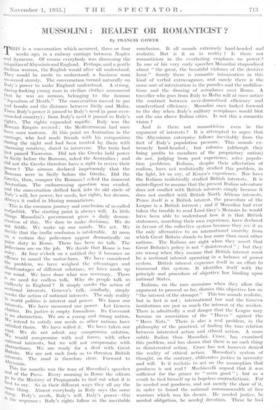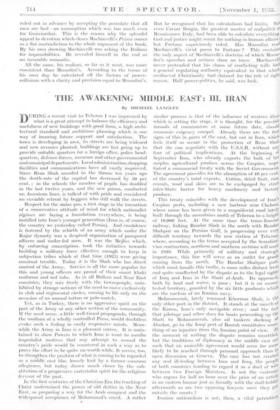MUSSOLINI: REALIST OR ROMANTICIST
By FRANCIS GOWER
THIS is a conversation which occurred, .three or four weeks ago, in a railway carriage between Naples 'and Syracuse. Of course everybody. was discussing the iniquities of Abyssinia and England. Perhaps, said a gentle • Sicilian woman, the English would after all understand. They would be .made to. understand,. a.. business man answered' sternly. The conversation turned naturally on Italy's power to make England understand. A strong, daring-looking young man in civilian clothes announced that he was • an airman, belonging to the famous Squadron of Death." The conversation moved to gas and bombs and the distance between Sicily and Malta. Prom Italy's power it passed to Italy's need (a poor over- crowded. country) ; from Italy's need it passed to Italy's lights. .The rights expanded rapidly. Italy was the Ileman, Empire revived ; the Mediterranean had once been mare nostrum,. At this point an Australian in the carriage, who had made friends with his companions `luring the night and had been treated by them with 'harming courtesy,• dared to intervene. The train had just passed Taormina. Did not the Greeks hold power Sicily before the Romans, asked the Australian ; and Ad not the Greeks therefore have a right to revive their 'Power ? The airman . declared impetuously that the 'Romans were in Sicily before the Greeks. Did the • Ureeks, then, conquer the Romans? re.ked the innocent Australian. The embarrassing question was evaded, :old the conversation drifted back into its old circle of Italy's will, her power, her needs, her rights, her dreams, 'Always it ended in blazing romanticism.
' This is the common journey and conclusion of so-called wilpolitik. The starting point is always will. In little things Mussolini's government gives a daily demon- stration of this. We dare to make decisions. We do not fiddle. We Make up our minds. We act. We decide that the traffic confusion is intolerable. At noon on a certain day policemen appear dramatically on Point duty in Rome. There has been no talk. The 'Policemen are on the job. We decide that Rome is too ilaisy. At four o'clock on a notified day it becomes an cif-fence to sound the motor-horn. We have considered the problem, • we have weighed the advantages and 4-bsadvantages of different solutions, we have made up our mind. We have done what was necessary. There no need for endless talk. Why do people talk so endlessly in • England ? It simply masks the action of sectional • interests. Geneva's • talk, similarly, simply !luisks the action of national interests. The only reality 1.11 World polities is interest and power. We know our interests. We have measured our power. Let Geneva hatter. Its justice is empty formalism. Its Covenant is abstraction. We are a young and strong nation. , e intend to satisfy 'our needs as other nations have E4•islied- theirs. We have willed it. We have taken our road. We do not admit any compromise solution. .k,, e would compromise with real forces, with other lutional interests, but we will not compromise with "abstractions. We are ready for a deal with Great Britain. We are not such fools as to threaten British interests. The road • is therefore clear. Forward to AbYssinia. • This for months was the tone of Mussolini's speeches QM of the Press. Every morning in Rome the editors lso to the Ministry of Propaganda to find out what it is Pest to say. So in their different ways they all say the tame t naue thing. Almost everybody in Italy says the same the same Italy's needs, Italy's will, Italy's power—this is the sequence : Italy's rights follow as the inevitable conclusion. It all sounds extremely hard-headed and realistic. But is it .so in reality ? Is there not romanticism in the everlasting emphasis on power? In one of his very early speeches Mussolini rhapsodised about " the great, the beautiful violence of the decisive hour." Surely there, is romantic intoxication in this kind of verbal extravagance, and surely there is the same sort of intoxication in the parades and the mobilisa- tions and the droning of aeroplanes over Rome. A traveller who goes from Italy to Malta will at once notice the contrast between over-dramatised efficiency and unadvertised efficiency. Mussolini once looked forward to the day when Italy's military aeroplanes would blot out the sun above Italian cities. Is not this a romantic vision ?
• And is there not romanticism even in the argument of interests ? It is attempted to argue that the Abyssinian enterprise follows inevitably from the fact of Italy's population pressure. This • sounds ex- tremely hard-headed ; but colonies (although they bring profits to members of the proprietary nation) do • not, judging from past experience, solve popula- tion problems. Italians, despite their affectation of realism, have not realistically studied • this problem, in the light, let us say, of Kenya's experience. Nor have the Italians realistically studied British interests. It is unintelligent to assume that the present Italian adventure does not conflict with British interests simply because it does not conflict with British North African -interests. Peace itself is a• British interest, the procedure of the League is a British interest ; and if Mussolini had ever taken the trouble to read Lord Grey's Memoirs he would have been able to understand how it is that British statesmen; searching their own experience; have declared in favour of the collective system because they see it as the only alternative to an international anarchy from which Great Britain stands to lose more than most other nations.. The Italians are right when they assert that Great Britain's policy is not " disinterested " ; but they are wrong when they assume that British interest must be -a sectional interest operating in a balance of power system. British interest expresses itself in an effort to transcend this system. It identifies itself with the principle and procedure of objective laW binding upon national States.
Italians, on the rare occasions when' they allow the argument to proceed so far, dismiss this objective law as "the interest of the stronger." This too sounds realistic; but in fact is not ; international law and the 'Geneva institutions are just as much the interest of the weaker. There is admittedly a real danger that the League may become an association of the " Raves " against the Have Nots." There is also 'a real problem, in the philosophy of the practical, of finding the 'true relation between interested action and ethical action. A more subtle Italian than Mussolini, Croce, has • examined this problem, and has shown that there' is no such thing as disinterested action. Croce has not however denied the reality of ethical action. Mussolini's system of thought, on the contrary, obliterates justice in necessity and will. Is it realistic to act on the assumption that goodness is not real'? Machiavelli argued that it was sufficient for the prince to " seem good " ; but as a result he tied himself up in hopeless contradictions. Tor" he needed real goodness, and not merely' the show of it, in order to found the national commonwealth of free warriors which was his dream. lie needed justice, be needed obligation, he needed devotion. • These he had ruled out in advance by accepting the postulate that all men are bad—an. assumption which was too much even for Guicciardini. This is the reason why the splendid appeal to devotion which closes Machiavelli's Prince comes as a flat contradiction to the whole argument of the book. By his own showing Machiavelli was asking the Italians for impossibilities: He revealed himself in the end as an incurable romantic.
All the same, his realism, so far as it went, was more consistent than Mussolini's. According to the terms of his own day he calculated all the factors of power- collisions with a clarity and precision equal to Mussolini's. But he recognised that his calculations had liMits. Not even Caesar Borgia, the greatest master of realpolitik in Renaissance Italy, had been able to calculate' eVerythiog. God and justice might count for nothing in human affairs but Fortune capriciously ruled. Has Mussolini read • Machiavelli's vivid poeM to Fortune ? This. contains . the only aspect of Machiavelli's doctrine of which'Musso. lini's speeches and actions show no trace; • Machiavelli never pretended that his chaos of conflicting 'Wills had a general regulating authority equivalent to 'that which mediaeval Christianity had claimed for the rule of right reason. Half power-politics, he said,• was luck. •



























































 Previous page
Previous page